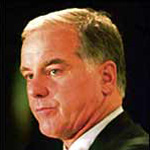 Second-choice candidates deserve voters' scrutiny
Second-choice candidates deserve voters' scrutinyBy Darren Allen
Published March 19th 2006 in The Rutland Herald (VT)
One of the biggest questions opponents of instant runoff voting need to answer is, "What are you afraid of?"
Sen. Hinda Miller, the Burlington Democrat who lost her bid for mayor in a race that featured instant runoff voting for the first time, said the whole process has left her bruised and dismayed.
She told her colleagues in the state Senate last week that while she does not dispute the results – Rep. Robert Kiss, a Burlington Progressive, led on both the first and second ballots – she wondered whether the whole process left voters susceptible to undue influence by the candidates.
"I as a candidate couldn't figure out how to game the system, and it is a game," she said. "I personally found it very scary."
The heart of her fear was the belief that her Republican opponent, longtime city councilor Kevin Curley, had told his supporters to mark Kiss as their second choice. Indeed, Curley boasted after the election that even though he didn't win, he saved the city from a Hinda Miller administration.
"This changes how candidates have to think about ourselves," she said. "I don't think candidates ought to be able to influence people like that. That is not what we are about in this country."
Such sentiments should leave voters wondering whether this major-party candidate has much faith in their intelligence. After all, what did she think the endorsements and sizable campaign war chests of U.S. Sen. Patrick Leahy, Democratic National Committee Chairman Howard Dean, outgoing Mayor Peter Clavelle were supposed to do? Influence voters' decisions?
Of course they were.
Under instant runoff voting, voters were asked to mark a first and second choice. If a single candidate reaches a majority of votes cast, then there is no runoff. If, as happened in Burlington's race, none does – Kiss had 39 percent, Miller 31 percent and Curley 26 percent – then the bottom candidates drop out and their second choices are distributed to the remaining two.
There was much speculation that Curley's strategy ultimately hurt Miller. But an analysis of where Curley's second-choicers went reveals a third went to Miller, a third to Kiss and a third to no one. And, in the end, Kiss won by the same percentage margin on the second vote.
In other words, it appeared that instant runoff voting worked: The candidate who got the most votes won.
Instant runoff voting worked so well in Burlington that its supporters are hoping to introduce it to statewide races. It is a proposal that is long overdue. In Vermont, if statewide office seekers fail to reach a majority, then the 180 lawmakers get to make the call. That's hardly a recipe for participatory democracy.
"This is going to get more people involved in the process, and I am supportive of anything that gets more of us engaged," said Anthony Pollina, a Progressive activist who has run for statewide office, and lost. "People are trying to find fault in IRV. It's not the process that failed."
In the end, Burlington was able to avoid the expense of a runoff election. Its voters got to make informed choices among candidates who conducted a spirited campaign. And it made it easier for citizens to have a say in who will lead their city for the next three years.
It's high time Vermont takes the experiment statewide. Democrats were generally supportive of the notion before Burlington's election. Their heavily favored and financed candidate lost, and that has probably tempered some of their enthusiasm. It shouldn't temper ours.
But, really, was it the failure of the voting method or the failure of the candidate to connect with a majority of voters? In the end, the voters had a direct say.
Isn't it time for us to select our statewide officeholders directly rather than leave it potentially up to the politically charged General Assembly?
Darren Allen writes weekly about Vermont issues, people and events.
 On March 16th, Former Vermont Governor and Democratic National Committee Chair Howard Dean continued his support for instant runoff voting on Vermont Radio's Mark Johnson Show. Commenting on Burlington's recent IRV election, Dean said "I think the best and most democratic way to use to elect people in multiparty elections is instant runoff voting." Dean also supported the system when it was first used in Burlington in 2006.
On March 16th, Former Vermont Governor and Democratic National Committee Chair Howard Dean continued his support for instant runoff voting on Vermont Radio's Mark Johnson Show. Commenting on Burlington's recent IRV election, Dean said "I think the best and most democratic way to use to elect people in multiparty elections is instant runoff voting." Dean also supported the system when it was first used in Burlington in 2006. Citizens of Burlington, Vermont went to the polls on Tuesday, March 3rd to vote for the second time in an election using instant runoff voting. At 8:25 PM, the city declared that incumbent Mayor Bob Kiss had won reelection in the third and final round of counting, narrowly edging out challenger Kurt Wright, 51.5% to 48.5%. The race was unique in that it had four candidates that had a legitimate shot at winning: Progressive Kiss, Republican Wright, Democrat Andy Montroll, and independent Dan Smith. In most other American cities, there would be fear of "spoiler" candidates, but IRV allowed all four candidates to run without having to worry about being labeled "spoilers."
Citizens of Burlington, Vermont went to the polls on Tuesday, March 3rd to vote for the second time in an election using instant runoff voting. At 8:25 PM, the city declared that incumbent Mayor Bob Kiss had won reelection in the third and final round of counting, narrowly edging out challenger Kurt Wright, 51.5% to 48.5%. The race was unique in that it had four candidates that had a legitimate shot at winning: Progressive Kiss, Republican Wright, Democrat Andy Montroll, and independent Dan Smith. In most other American cities, there would be fear of "spoiler" candidates, but IRV allowed all four candidates to run without having to worry about being labeled "spoilers." On April 4, Vermont governor Jim Douglas chose to veto legislation to re-establish majority elections for Congress in his state through instant runoff voting. Vermont would have been the first state to enact IRV for Congress; legislative leaders affirmed their commitment to the bill, and it is sure to move in the state again. FairVote has worked hard to support this legislation, which likely generated more than 600 phone calls to the governor from Vermonters.
On April 4, Vermont governor Jim Douglas chose to veto legislation to re-establish majority elections for Congress in his state through instant runoff voting. Vermont would have been the first state to enact IRV for Congress; legislative leaders affirmed their commitment to the bill, and it is sure to move in the state again. FairVote has worked hard to support this legislation, which likely generated more than 600 phone calls to the governor from Vermonters.